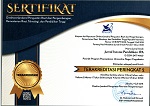Navigating Diversity: Exploring Inclusive Citicenship and Recognition of Minority Rights in the Indonesian Context
Abstract
Keywords
Full Text:
PDFReferences
Abi, A. R. (2017). Paradigma Membangun Generasi Emas Indonesia Tahun 2045. Jurnal Ilmiah Pendidikan Pancasila dan Kewarganegaraan, 2(2), 85-90.
Bartlett, R. (2022). Inclusive (Social) Citizenship and Persons with Dementia. Disability & Society, 37(7), 1129-1145. https://doi.org/10.1080/09687599.2021.1877115.
Bauer, S., Milani, T. M., von Bromssen, K., & Spehar, A. (2023). Constructing the Good Citizen: Discourses of Social Inclusion in Swedish Civic Orientation. Social Inclusion, 11(4), 121-131. https://doi.org/10.17645/Si.V11i4.7060.
Biseth, H., Hoskins, B., & Huang, L. (2021a). Civic and Citizenship Education: From Big Data to Transformative Education. Dalam H. Biseth, B. Hoskins, & L. Huang (Eds.), Northern Lights on Civic and Citizenship Education: A Cross-National Comparison of Nordic Data from ICCS (hlm. 147-160). New York: Springer International Publishing. https://doi.org/10.1007/978-3-030-66788-7_7.
Biseth, H., Hoskins, B., & Huang, L. (2021b). Using IEA International Civic and Citizenship Education Study (ICCS) Data: Northern Lights on ICCS. Dalam H. Biseth, B. Hoskins, & L. Huang (Eds.), Northern Lights on Civic and Citizenship Education: A Cross-National Comparison of Nordic Data from ICCS (hlm. 1-18). New York: Springer International Publishing. https://doi.org/10.1007/978-3-030-66788-7_1.
Bolzendahl, C., & Coffe, H. (2013). Are Good Citizens Good Participants? Testing Citizenship Norms and Political Participation Across 25 Nations. Political Studies, 61(1), 45-65. https://doi.org/10.1111/1467-9248.12010.
Carbone, M. B. (2023). Migrants, Refugees, Invaders: Responses to the Riace Model’s Inclusive Citizenship Project. Journal of Modern Italian Studies, 28(4), 415-432. https://doi.org/10.1080/1354571X.2023.2198288.
Ferreira, A. P. (2024). Citizenship and Identity: From Inclusion in the School Context to Valorization of the Communities of Practice. The International Journal of Learner Diversity and Identities, 31(1), 79-98. https://doi.org/10.18848/2327-0128/CGP/v31i01/79-98.
Finch, N. (2021). Inclusive Citizenship and Degenderization: A Comparison of State Support in 22 European Countries. Social Policy & Administration, 55(7), 1224-1243. https://doi.org/10.1111/spol.12716
Goodman, S. W. (2022). Good Citizens in Democratic Hard Times. The ANNALS of the American Academy of Political and Social Science, 699(1), 68-78. https://doi.org/10.1177/00027162211069729.
Hanafi, Y., et al. (2022). Students’ Perspectives on Religious Moderation: A Qualitative Study into Religious Literacy Processes. HTS Theological Studies, 78(1), 1-10. https://doi.org/10.4102/hts.v78i1.7638
Hanafi, Y., et al. (2023). What Content Offers and How Teachers Teach: Religious Moderation-Integrated Teaching in Indonesia. HTS Theological Studies, 79(2), 1-8. https://doi.org/10.4102/hts.v79i2.9070.
Hanafi, Y., et al. (2024). Experiencing Less Apprehension and Engaging Religious Communication: the Team-Based Project Learning Practices. Cogent Education, 11(1), 1-11. https://doi.org/10.1080/2331186X.2024.2332852.
Herlinawati, H., Marwa, M., Ismail, N., Junaidi, Liza, L. O., & Situmorang, D. D. B. (2024). The Integration of 21st Century Skills in the Curriculum of Education. Heliyon, 10(15), 1-7. https://doi.org/10.1016/j.heliyon.2024.e35148.
Hikmah, L., & Suharno, S. (2022). Students Multicultural Awareness of Aceh Dormitory in Yogyakarta. Jurnal Civics: Media Kajian Kewarganegaraan, 19(1), 143-153. https://doi.org/10.21831/jc.v19i1.40371.
Hjerm, M., Seva, I. J., & Werner, L. (2018). How Critical Thinking, Multicultural Education and Teacher Qualification Affect Anti-Immigrant Attitudes. International Studies in Sociology of Education, 27(1), 42-59. https://doi.org/10.1080/09620214.2018.1425895.
Horst, C., Erdal, M. B., & Jdid, N. (2020). The Good Citizen: Asserting and Contesting Norms of Participation and Belonging in Oslo. Ethnic and Racial Studies, 43(16), 76-95. https://doi.org/10.1080/01419870.2019.1671599.
Ikhsan, M. A. (2017). Fikih HAM dan Hak Kebebasan Beribadah Minoritas Dzimmi di Indonesia. Jurnal Ilmiah Pendidikan Pancasila dan Kewarganegaraan, 2(1), 34-40. https://doi.org/10.17977/um019v2i12017p034.
Ikhsan, M. A. (2019). Prosecuting the House of God: The Irony of Rights to Freedom of Worship for Dhimmi Minority in Indonesia. Justicia Islamica, 16(1), 1-20. https://doi.org/10.21154/justicia.v16i1.1535.
Kariya, T. (2012). Is Everyone Capable of Becoming a Good Citizen in Japanese Society? Inequality and the Realization of the Good Citizen Education. Multicultural Education Review, 4(1), 119-146. https://doi.org/10.1080/23770031.2009.11102891.
Komalasari, K., Fitriasari, S., & Anggraini, D. N. (2021). Living Values-Based Digital Learning Resources in Civic Education. The New Educational Review, 63(1), 85-96. https://doi.org/10.15804/tner.21.63.1.07.
Marzuki, Miftahuddin, M., & Murdiono, M. (2020). Multicultural Education in Salaf Pesantren and Prevention of Religious Radicalism in Indonesia. Jurnal Cakrawala Pendidikan, 39(1), 12-25. https://doi.org/10.21831/cp.v39i1.22900.
Matunga, B. N., & Kontinen, T. (2023). Is No One Left Behind? Inclusive Citizenship in Practices of Self-help Groups in Rural Tanzania. Forum for Development Studies, 50(1), 83-105. https://doi.org/10.1080/08039410.2023.2176784.
Muleya, G. (2020). Curriculum Policy and Practice of Civic Education in Zambia: A Reflective Perspective. Dalam A. Peterson, G. Stahl, & H. Soong (Eds.), The Palgrave Handbook of Citizenship and Education (hlm. 185-194). New York: Springer International Publishing. https://doi.org/10.1007/978-3-319-67828-3_53.
Parapat, S. H., Caniago, I. W., Suryani, I., Ariani, H., Siregar, T. H., & Yusnaldi, E. (2024). Keberagaman Sosial dan Budaya di Indonesia. Jurnal Pendidikan Tambusai, 8(1), 1255-1261. https://doi.org/10.31004/jptam.v8i1.12537.
Putra, A. P., Yuliarti, S., & Muammar, M. (2020). Arah Pendidikan Kewarganegaraan pada Masa Covid-19 Demi Terwujudnya Good Citizenship. Jurnal Pendidikan Sosial Keberagaman, 7(2), 131-143. https://doi.org/10.29303/juridiksiam.v7i2.131.
Rautiainen, M., Hiljanen, M., & Tallavaara, R. (2023). Education for Democracy and Democratic Citizenship. Dalam S. H. Klausen & N. Mard (Eds.), Developing a Didactic Framework Across and Beyond School Subjects (hlm. 197-209). Inggris: Routledge. https://doi.org/10.4324/9781003367260-18.
Reichert, F. (2016). Who is the Engaged Citizen? Correlates of Secondary School Students’ Concepts of Good Citizenship. Educational Research and Evaluation, 22(5-6), 305-332. https://doi.org/10.1080/13803611.2016.1245148.
Samsuri. (2015). Kebijakan Pendidikan Kewarganegaraan Era Reformasi di Indonesia. Jurnal Cakrawala Pendidikan, 1(2), 267-281. https://doi.org/10.21831/cp.v0i2.4233.
Shofa, A. M. A. (2022). Praktik Toleransi Desa Pancasila sebagai Penguatan Keharmonisan Antar Umat Beragama. Jurnal Ilmiah Pendidikan Pancasila dan Kewarganegaraan, 7(3), 671-681.
Soeharto, Singh, S. S., & Afriyanti, F. (2024). Associations Between Attitudes Toward Inclusive Education and Teaching for Creativity for Indonesian Pre-Service Teachers. Thinking Skills and Creativity, 51(4), 101-109. https://doi.org/10.1016/j.tsc.2024.101469.
Szostek, J., & Orlova, D. (2022). Understandings of Democracy and Good Citizenship in Ukraine: Utopia for the People, Participation in Politics not Required. Post-Soviet Affairs, 38(6), 479-496. https://doi.org/10.1080/1060586X.2022.2084280.
Tektona, R. I. (2022). Kebijakan Pendidikan Kewarganegaraan dalam Era Disrupsi Globalisasi. Waskita: Jurnal Pendidikan Nilai dan Pembangunan Karakter, 6(1), 73-85. https://doi.org/10.21776/ub.waskita.2022.006.01.6.
Trevino, E., Carrasco, D., Claes, E., & Kennedy, K. J. (2016). Good Citizenship for the Next Generation: A Global Perspective Using IEA ICCS 2016 Data. New York: Springer International Publishing. https://doi.org/10.1007/978-3-030-75746-5.
Tupper, J. A., & Cappello, M. P. (2012). (Re)Creating Citizenship: Saskatchewan High School Students’ Understandings of the Good Citizen. Journal of Curriculum Studies, 44(1), 37-59. https://doi.org/10.1080/00220272.2011.618951.
Valles-Peris, N., & Domenech, M. (2024). Digital Citizenship at School: Democracy, Pragmatism, and RRI. Technology in Society, 76(1), 102-108. https://doi.org/10.1016/j.techsoc.2023.102448
DOI: http://dx.doi.org/10.17977/um019v9i3p1-10
Refbacks
- There are currently no refbacks.
Copyright (c) 2024 Jurnal Ilmiah Pendidikan Pancasila dan Kewarganegaraan

This work is licensed under a Creative Commons Attribution 4.0 International License.
View My Stats











